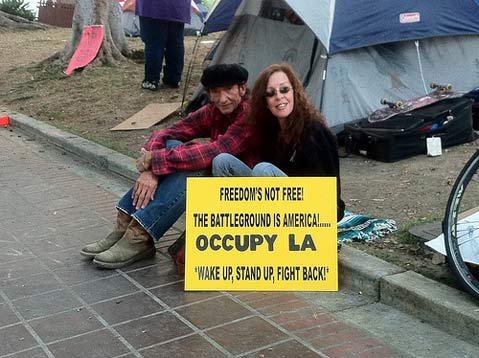Heist: Who Stole the American Dream?
An Interview with Co-Director/Co-Producer Frances Causey

As Americans continue to watch the Occupy movement unfold in their own backyards and around the world, the feature documentary Heist: Who Stole the American Dream? explores the roots of protesters’ grievances and class warfare within the U.S. economy over the last 40 years.
An entry in the Fund for Santa Barbara Social Justice Award for Documentary Film for the 2012 Santa Barbara International Film Festival, co-director and co-producer Frances Causey hopes that Heist will be viewed as an educational tool for audiences to “connect the dots” and mobilize against American corporations dominating policymaking by demanding democratic reform. While Heist explores the negative benefits of deregulation and free market advocacy for middle-class prosperity, the documentary also encourages audience to pursue grassroots solutions, such as supporting local businesses and credit unions, and joining labor union organizations.
She recently answered some of my questions.
What inspired you to produce a film about the Occupy movement?
We actually began working on Heist six years ago. My co-director Donald Goldmacher and I at the time were investigating the exploitation of undocumented workers on the Arizona border where I live. And it became really clear early on that what was happening on the border was part of a larger story about the transformation of the U.S. economy to serve the interests of a few at the expense of many — that is all workers, white and blue collar alike.
Would you say you have been able to tell this story differently from other media and news organizations who have been covering the Occupy movement for some time now?
I think we have been able to dig deeper and understand the complexities of our economic-political system over the last 40 years. For instance, understanding how money talks in the media, investigating the corporate takeover of the mainstream media and the implications of that for our democracy.
Do you truly believe that big business, capitalism, the U.S. in general supports the notion that “if you’re poor, you’re on your own”?
Sadly yes. According to the latest census data, a record number of Americans — nearly 1 in 2 — have fallen into poverty or are scraping by on earnings that classify them as low income because of rising living costs. As Bernie Sanders says so beautifully in our film, the goal today for many is to be one of those people who has tremendous wealth and power. Our system is instilled with ethos that we can all pull ourselves up by our “boot straps” but what happens when those boots have been stolen?
What was it like having progressive radio talk show host and New York Times bestselling author Thom Hartmann narrate the documentary?
Thom is such a delight, a very kind and generous man. I was really intimidated at first because Thom is so knowledgeable on so many levels but he wholeheartedly endorsed our film.
Could you please elaborate on the idea that there are only two powers in America, organized money and organized people?
American style democracy has always been about the power of people to influence the direction of their government through the power of voting. When you voted for Democrats you generally got one platform and Republicans another. But today both parties eager to be re-elected are tethered to organized money in the form of lobbying, which represents big money interests such as the corporatacracy, not individual citizens. Thus big money has disproportionate power to influence lawmakers and the government. An example would be the Supreme Court case “Citizens United” which gave organized money no limits on the amount of money they could spend to influence electoral politics.
Heist seemed to idolize the economic policies of FDR and demonize the economic policies of Reagan. Is this the sentiment viewers should take?
Yes I hope so! Americans needs to realize that in many ways we have a one party system in this country. On economic issues the Democrats don’t look much different from Republicans but this was not always the case which is why we illustrate what FDR did for younger audiences. Many below the age of 30 have no idea about this economic history, or that FDR created policies that favored creation of wealth but also shared the societal burdens more fairly. There is little doubt in my mind after six years of research that Reagan — under the myth of the free market — created and implemented policies that led to the destruction of the middle class, the cornerstone of American democracy.
The movie touches upon the idea of restoring fair taxation and public financing in the U.S. Could you go further into detail about this?
Fair taxation would mean a progressive tax system that forces the hugely wealthy (those who live off of investments not a paycheck) to pay their fair share, not the 15 percent they pay now. The middle class is burdened with a greater share (roughly 35 percent) at a time when they can least afford it. There are certain things that the government needs to wholeheartedly support and which is vitally important to the overall health of the country such as education. The government needs to commit to education and not rely on things like school vouchers. We can’t continue to privatize everything for profit (it’s only about the bottom line) and expect our society to flourish.
Heist: Who Stole the American Dream? will premiere on Friday, January 27, 1 p.m. at the Metro 4, with a second screening on Saturday, February 4, 10:00 a.m. at Metro 4.



